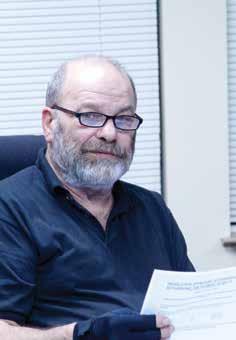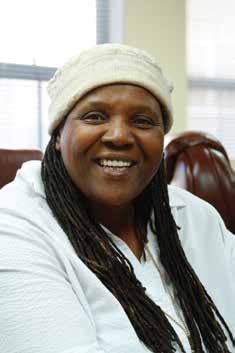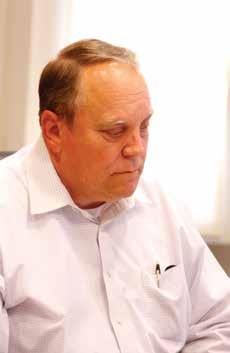
8 minute read
El Ravenswood July-August 2020
Recent meetings held by the East Palo Alto Sanitary District have been, to say the least, disastrous, unproductive and frustrating for all involved.
The East Palo Alto Sanitary District is among the oldest public agencies in East Palo Alto and Menlo Park. One would consequently expect it to have time-tested practices on how to conduct public meetings. This has sadly not been the case, at least in the last few meetings.
Advertisement
These recent meetings held to discuss the Light Tree Apartments, Sobrato Phase II, The Primary School and other developments, have left many angry and frustrated. Not only because no useful outcomes have come out of the meetings, but the manner in which the meetings have been conducted clearly illustrated the need for the East Palo Alto Sanitary District to relearn the proper protocols for conducting public meetings.
Perhaps not all the District directors have the experience or knowledge of conducting public meetings. It is well known that few, if any, members of the public attend District meetings, and, maybe as an unfortunate consequence, some directors on the board lack the practice as to how to manage such meetings. East Palo Alto Sanitary District meetings have previously been simply conversations between Board members and their professional staff.
Making matters worse is the unfortunate tendency that the District’s General Manager, Akin Okupe, has of vociferously reacting to statements made by members of the public, somehow ignoring the fact that the Board meeting is a forum for the board of directors, and that every statement made during the meeting by invited presenters or the public, are directed to the Board, and specifically, to the person chairing the meeting.
None of the Directors, veterans Dennis Scherzer and Glenda Savage and recently elected Martha Stryker, ever stepped in to help their colleague Betsy Yanez follow the District’s own established meeting protocols or even try to rein in their staff.
Those protocols, outlined on the District website, clearly state that, “persons wishing to speak on matters listed on the agenda will be heard when the President calls for comments from the audience….the President may specify the number of minutes each person will be permitted to speak based on the number of persons wishing to speak and the time available. After the public has commented, the item is closed to further public comment and brought to the Board for discussion and action. There is no further comment permitted from the audience unless invited by the Board.”
The District would benefit from looking at how other local agencies conduct their meetings, how they handle public input or presentations from various organizations, and most importantly, how they transition into getting a consensus on a specific action or outlining next steps.
More importantly, however, the District should follow its own meeting protocols and be clear on how directors can comment on presentations, ask additional questions of presenters and district staff, and subsequently, take action that the Directors can build consensus around. They should also be clear as to how their professional staff should participate in their meetings. Doing that will help the District go a long way in streamlining the discussion on an issue and help the District avoid the discombobulated atmosphere that has overwhelmed its most recent meetings.

El Ravenswood continues its series on public agency compensation with this issue focusing on the two sanitary sewer districts serving both East Palo Alto and Menlo Park. The two wastewater special districts, the East Palo Alto Sanitary District (EPASD) and the West Bay Sanitary District (WBSD), have their boundaries stretching into both cities.
In 2018, the East Palo Alto Sanitary District had five employees while West Bay Sanitary District had 30. In the same year, the General Manager’s compensation accounted for 8% of the West Bay Sanitary District’s total personnel budget, however the East Palo Alto’s General Manager/ District Engineer’s compensation accounts for 50% of the agency’s total personnel budget.
While the average compensation for the Board of Directors for West Bay was $5,005 annually, accounting for 0.14% of its total personnel budget, the average director compensation for the East Palo Alto Sanitary District was $16.576 in 2018, accounting for 4% of the District’s personnel expenses. In addition, EPASD directors receive benefits.
Special districts are local government agencies established in a community to provide a service usually in an area not provided by the county or city. Special districts are either enterprise districts that bill customers directly or through property taxes (such as both the EPASD and Westbay Sanitary District) or non-enterprise districts that are funded by voter-approved taxes or assessments (e.g., recreation or fire districts). Dennis Scherzer, the longest serving Director on the East Palo Alto Sanitary District.


Glenda Savage Highest compensated Director in 2018. Akin Okupe General Manager/ District Engineer.


Phil Scott West Bay Sanitary District 2018 General Manager
Chief Bertini Blindsides Council With Retirement Announcement
Dave Bertini, the City find his replacement. His statement of Menlo Park Police came after over an hour of public Chief since July 9, 2018, expressions of anger and disaffection unexpectedly announced with policing practices across the his retirement June 18 at a town hall nation and particularly in Menlo Park. meeting convened to discuss policing Councilmember Muller, minutes before in Menlo Park. The meeting was called the chief’s announcement, had sought following the nationwide unrest over an answer as to how Menlo Park Police the Memorial Day on-camera execution would respond to the crisis. of George Floyd by a Minneapolis law Earlier, Councilmember Nash Dave Bertini, Former Menlo Park enforcement officer. admitted that she had recently learned police Chief.
A shocked Mayor Cecilia Taylor of the existence of a police advisory immediately called a fifteen-minute body and admitted to not knowing its Police Chief January 6, 2018, and recess. Before abruptly cutting off membership and how members were subsequently as Menlo Park’s top cop his mike and turning off his video, appointed. She wondered whether some July 9, 2018. the retiring chief indicated that he of its members were from her district. His 32-year career in law enforcement would be willing to serve until July Bertini was appointed by then city began as a police explorer with the 31 to presumably allow the city to manager Alex McIntyre, first as Interim Pacifica Police Department.

Aretirement announcement is usually an occasion that calls for accolades, congratulatory statements and maybe even some tears of joy or sadness. In public bodies, at least from my experience, immediate supervisors get to know about a staff person’s intent to retire before a policy making body does.
Dave Bertini Menlo Park’s Police Chief, however, chose to announce his retirement at a June 18 town hall meeting convened to discuss the local implications of the nationwide demonstrations following George Floyd’s public execution at the knee of a Minneapolis law enforcement official.
The Dave Bertini announcement was akin to leaving a room following a deliberate flatulent episode intended to display the disdain and disrespect that he had for those in attendance.
In what can be perceived as a lame self-serving gesture, he offered to stay in the position until July 31, ostensibly to allow the city to find a replacement.
Following his announcement, he left the online meeting disappearing from the screen and shutting off his audio.
The four members of the Menlo Park City Council present were surprised and may have felt blindsided by the shocking announcement as well as the way it was delivered. Mayor Taylor was visibly shocked and called for a fifteen-minute break. It would have understandably been hard to continue a discussion on policing in the city in the absence of its top cop.
The police chief’s announcement was unprofessional. The community does not deserve this from a public servant who was hired because of the confidence and faith that the city had in him and his ability to serve all Menlo Park residents.
Dave Bertini denied himself the opportunity to rise up to the challenge given the history of policing and the need to fundamental changes, particularly in light of how specific populations have been mal policed for centuries. The Chief should have answered Ray Mueller’s question about how the city needed to respond to the national crisis of confidence in policing to the best of his ability. He should have stayed for the entire duration of the town hall meeting. After all,
Mayor Taylor had to call recess to digest Chief’s abrubt retirement announcement. City Manager Jerome-Robinson sought to extend the chief’s tenure beyond July.
the meeting was set up for a purpose requiring his professional expertise. That he announced the retirement the way he did should have been grounds for immediate termination. The city manager should have given someone else in the department the opportunity to be interim chief while the city looked for his replacement.
That Starla Jerome-Robinson, the city manager, allowed his association with the city to continue beyond July 31 is baffling. After all, the odor the chief generated with his announcement is still wafting through the physical and online corridors of city hall.
The city needs an air-fresh start.



The ‘I” in Black Lives Matter painted by local Menlo Park Artist Janet Foster. Ms. Foster was selected to be one of the 16 artists chosen to paint a letter from the expression “Black Lives Matter.


Black Lives Matter painted on Fordham Street across from Jack Farrell Park.












